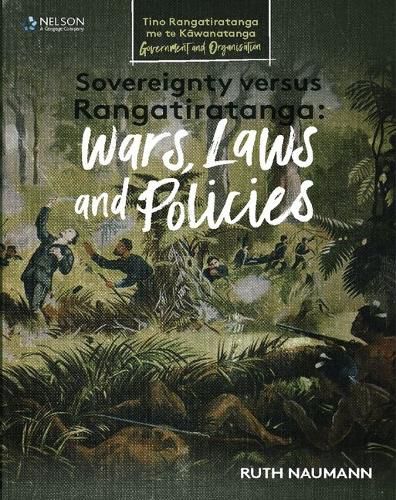Readings Newsletter
Become a Readings Member to make your shopping experience even easier.
Sign in or sign up for free!
You’re not far away from qualifying for FREE standard shipping within Australia
You’ve qualified for FREE standard shipping within Australia
The cart is loading…






Sovereignty vs Rangatiratanga: Wars, Laws and Policies addresses the theme of Tino Rangatiratanga me Te Kawanatanga/Government and Organisation in the new curriculum for Aotearoa/NZ histories.
People in canoes voyage south down the Pacific to begin a human history in a resource-rich land. These people form a relationship with the land and create a type of government, authority, laws, policies, organisation. Several centuries later, ships sail down and bring a new people to this land. They say they are the land’s discoverers, decide to make it a colony in their empire and negotiate a treaty with the first people to do this. They introduce their type of government, their authority, their laws, their policies, their organisation. The power struggle that follows involves wars through words and laws, and wars through guns. The first people watch their land and authority get tattered and torn and begin to disappear. The new people think the first people are dying out but the first people rally and try to renegotiate the relationship with the new people to make things more balanced. And they are still doing this. Today, all New Zealanders have the right to stand on this land, to know that they belong to it, and the responsibility to say they understand its history.
Links to the Curriculum
Know: Tino rangatiratanga me te kawanatanga | Government and organisation
National and local settings: Wars, laws and policies impact generally on all Aotearoa and on local areas specifically; what has relevance in one local area may have no or lesser relevance to another local area. Each chapter has scope for learning about local history.
Mahi Skills: Each chapter has five student activities that consist of a skill relating to Local History and another four general skills.
Processes: Social enquiry, Values exploration, Social decision-making.
$9.00 standard shipping within Australia
FREE standard shipping within Australia for orders over $100.00
Express & International shipping calculated at checkout
Sovereignty vs Rangatiratanga: Wars, Laws and Policies addresses the theme of Tino Rangatiratanga me Te Kawanatanga/Government and Organisation in the new curriculum for Aotearoa/NZ histories.
People in canoes voyage south down the Pacific to begin a human history in a resource-rich land. These people form a relationship with the land and create a type of government, authority, laws, policies, organisation. Several centuries later, ships sail down and bring a new people to this land. They say they are the land’s discoverers, decide to make it a colony in their empire and negotiate a treaty with the first people to do this. They introduce their type of government, their authority, their laws, their policies, their organisation. The power struggle that follows involves wars through words and laws, and wars through guns. The first people watch their land and authority get tattered and torn and begin to disappear. The new people think the first people are dying out but the first people rally and try to renegotiate the relationship with the new people to make things more balanced. And they are still doing this. Today, all New Zealanders have the right to stand on this land, to know that they belong to it, and the responsibility to say they understand its history.
Links to the Curriculum
Know: Tino rangatiratanga me te kawanatanga | Government and organisation
National and local settings: Wars, laws and policies impact generally on all Aotearoa and on local areas specifically; what has relevance in one local area may have no or lesser relevance to another local area. Each chapter has scope for learning about local history.
Mahi Skills: Each chapter has five student activities that consist of a skill relating to Local History and another four general skills.
Processes: Social enquiry, Values exploration, Social decision-making.